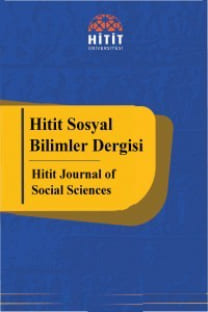STUDENT PERCEPTIONS FOR DISTANCE EDUCATION AND EFFICIENCY ANALYSIS OF THE SYSTEM
With the increase in the number of universities and students requesting distance education as well as the development of Information Technologies, new institutions providing distance education have come up and this situation has made the research of the efficiency of distance education a more important issue. Considering the social and economic structure, population growth rate and young population as well as the number of students and academicians in our country, it is realized that distance education is of high importance for our country. The aim of this study is to evaluate the distance education used in the mutual courses in Hitit University in 2013-2014 term (Turkish language, Ataturk’s Principles and History of Turkish Revolution) by the students, to analyze the efficiency and to develop distance education system in accordance with these findings. Survey method has been used to measure the perceptions of the students for distance learning and to evaluate the system of distance learning. The sampling of the research has been made up with 321 students randomly and homogeneously chosen among 4000 students actively studying in the faculties, graduate schools and vocational schools of Hitit University. Keywords: Efficiency Analysis, Distance Education Perception
___
- REFERENCES
- AKMEŞE, Ömer Faruk. (2015), Uzaktan Eğitimde Ders İçeriği Oluşturma Platformu, Kırıkkale Üniversitesi Fen Bilimleri Enstitüsü Yayımlanmamış Yüksek Lisans Tezi, Kırıkkale.
- AL, Umut, Madran, R. Orçun. (2004),” Web Tabanlı Uzaktan Eğitim Sistemleri:Sahip Olması Gereken Özellikler ve Standartlar”, Bilgi Dünyası cilt.5, S.2, ss. 259-271.
- ANTALYALI, Ömer Lütfi. (2004), Uzaktan Eğitim Algısı Ve Yöneylem Araştırması Dersinin Uzaktan Eğitim İle Verilebilirliği, Süleyman Demirel Üniversitesi Sosyal Bilimler Enstitüsü, Yüksek Lisans Tezi, Isparta.
- COŞKUN, Cihangir. (2007), Uzaktan Eğitim için Web Tabanlı Bir Platform Gelistirilmesi ve Mekanik Derslerine Uygulanması. Yüksek Lisans Tezi. Gazi Üniversitesi, Ankara.
- KAYA, Zeki, ULUĞ, F. (1997), Uzaktan Eğitim Yaklaşımıyla İlköğretim. Uzaktan Eğitim Vakfı, Ankara.
- LIONARAKIS, Antonis, PAPADEMETRIOU, Demetra. (2003), “The Quality Of The Learning Experience: A Comparative Study Between Open Distance And Conventional Education”, Turkish Online Journal of Distance Education-TOJDE, Cilt.4, S.2.
- SHACHAR, Mickey, NEUMANN, Yoram. (2003), “Differences Between Traditional and Distance Education Academic Performances: A Meta-Analytic Approach”, International Review of Research in Open and Distance Learning, Cilt.4., S.2.
- Şen, B., Atasoy, F., Aydın, N. (2010). “Düşük Maliyetli Web Tabanlı Uzaktan Eğitim Sistemi Uygulaması” [Bildiri], Akademik Bilişim 2010, 10-12 Şubat 2010, (ss. 1-12). Muğla: Muğla Üniversitesi.
- VERDUIN, John R., CLARK, Thomas A., Çeviri: Maviş, İ. (1994), Uzaktan Eğitim Etkin Uygulama Esasları, Anadolu Üniversitesi Basımevi, Eskişehir.
- TÜİK. (2014), (erişim adresi http://www.tuik.gov.tr/PreHaber Bultenleri.do?id=15975), (erişim tarihi:18 Kasım 2014).
- Yayın Aralığı: Yılda 2 Sayı
- Başlangıç: 2008
- Yayıncı: Hitit Üniversitesi
Sayıdaki Diğer Makaleler
XIX. YÜZYIL RUS EDEBİYATINDA ELEŞTİRİ
OKUL YÖNETİCİLERİNİN MOTİVASYONLARINI ETKİLEYEN UNSURLAR
2007 SEÇİMİNİN SİYASAL DEĞER HARİTASI: SİYASETÇİLERİN SÖYLEMLERİ ÜZERİNE BİR DEĞER ANALİZİ
OKUL ÖNCESİ ÖĞRETMENLERİNİN FARKLILIKLARIN YÖNETİMİNE İLİŞKİN ALGILARININ İNCELENMESİ
Erhan ALABAY, Sultan Bilge KESKİNKILIÇ KARA
TANZİMAT MİZAHININ SONU: 1877 MATBUAT KANUNU TARTIŞMALARI VE OSMANLI’DA MİZAH DERGİLERİNİN KAPANMASI
STUDENT PERCEPTIONS FOR DISTANCE EDUCATION AND EFFICIENCY ANALYSIS OF THE SYSTEM
Ömer Faruk AKMEŞE, Emre DEMİR, Emre DÜNDER
MEKÂNSAL AYRIŞMANIN BİR YENİ BİÇİMİ OLARAK KAPALIKAPILI SİTELER AKKENT KONUTLARI ÖRNEĞİ
